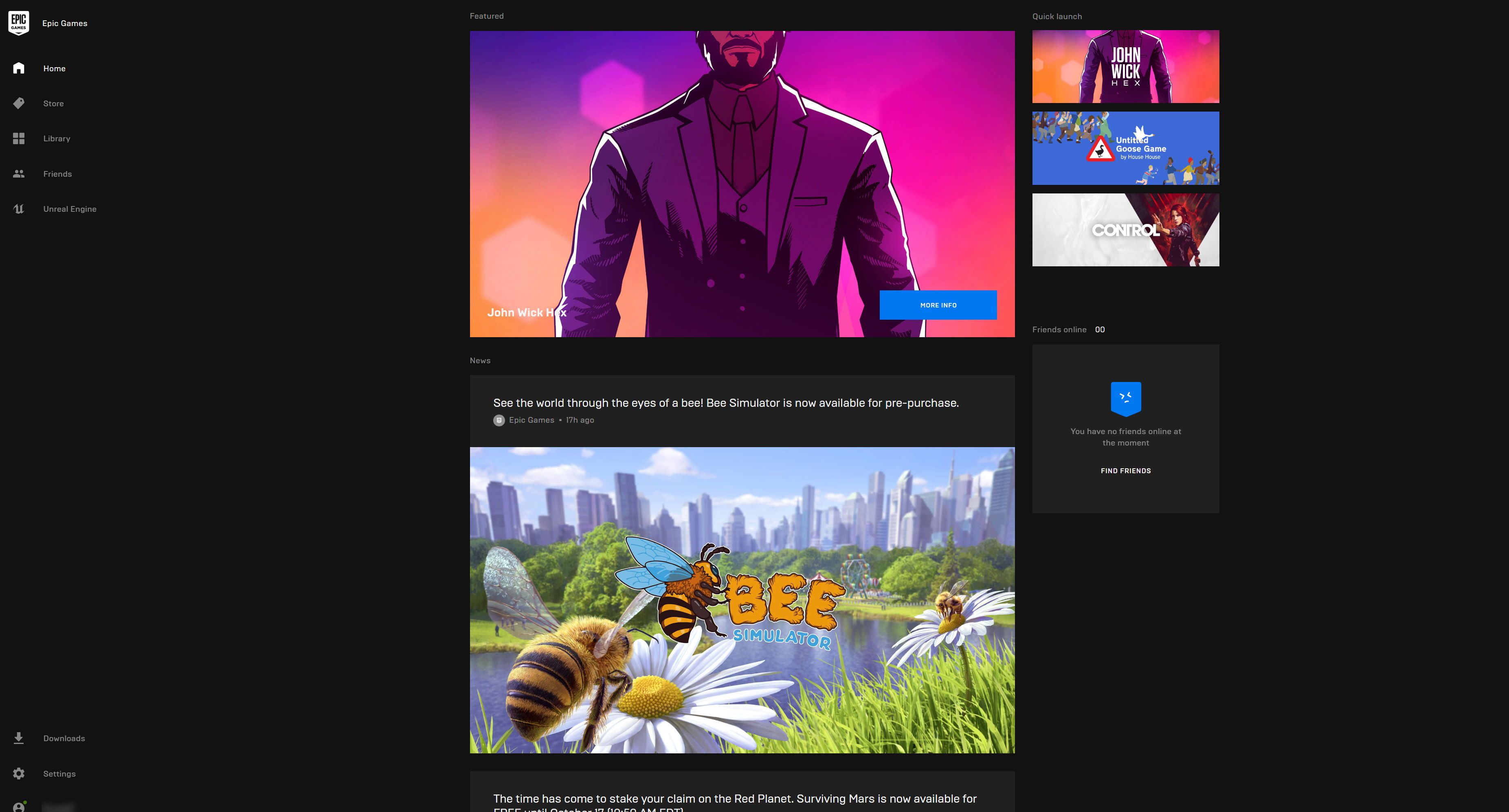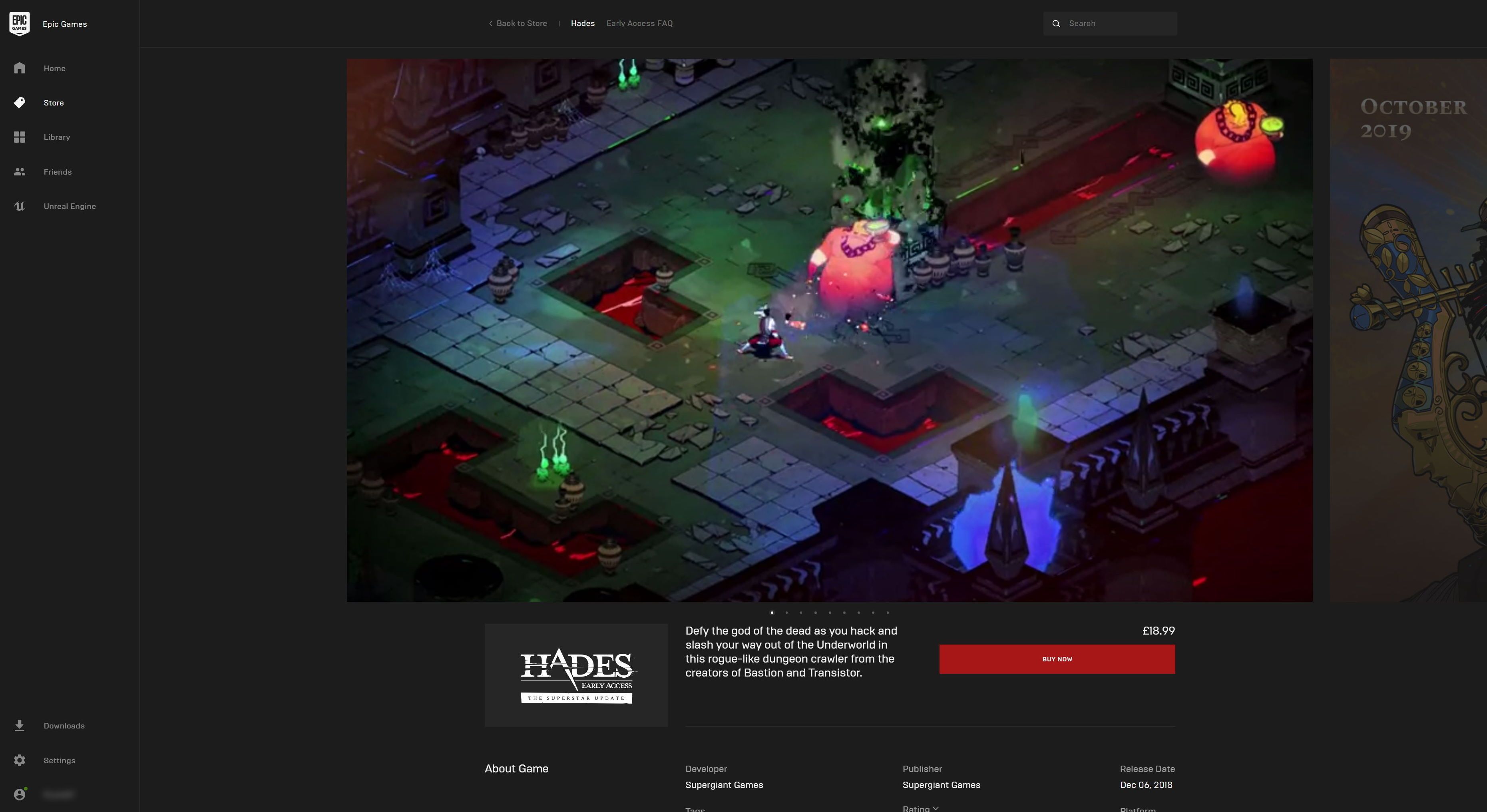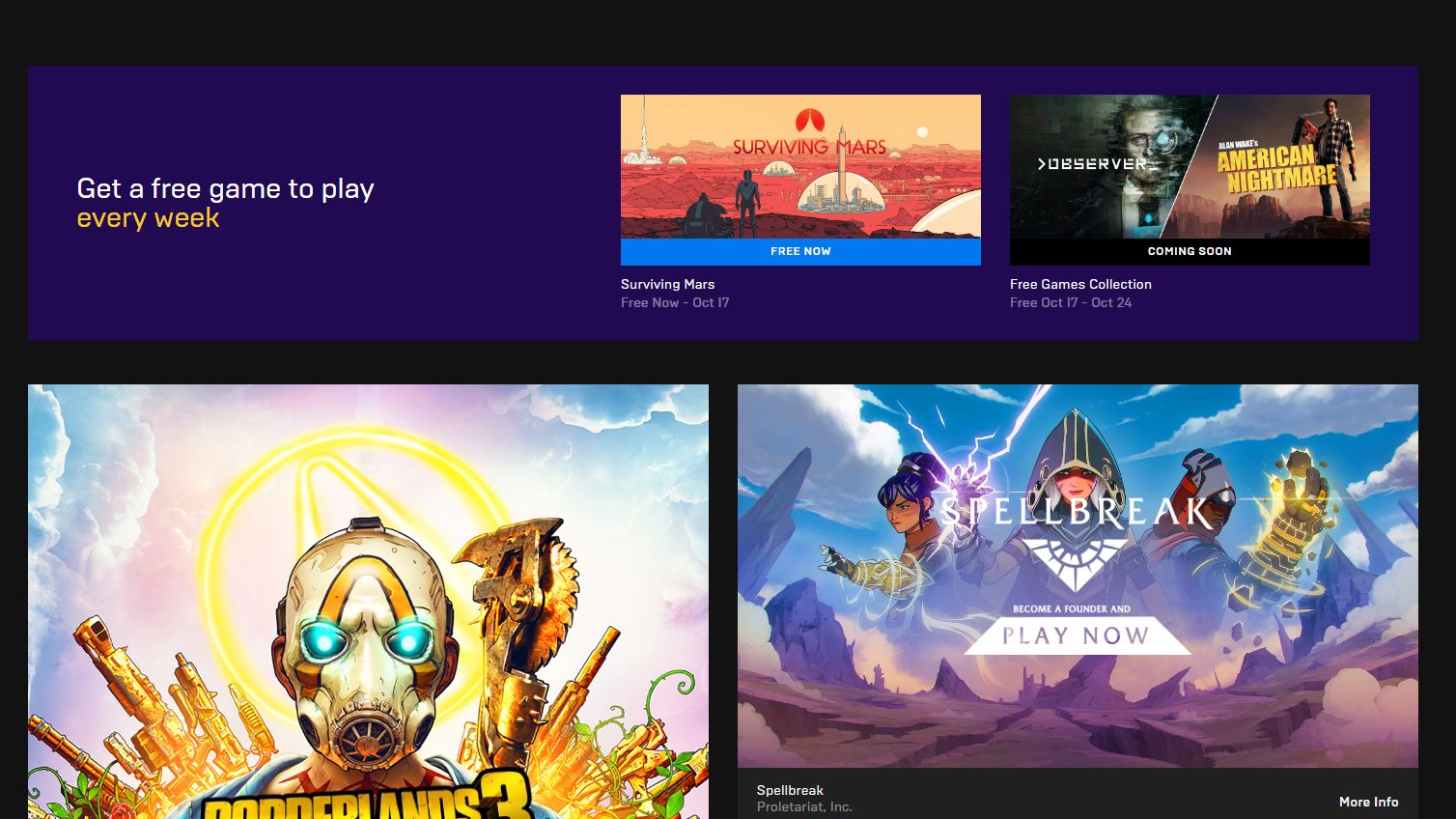Epic Games Store: Nearly one year from launch, how is it to use?
The Epic Game Store: reviewed
The Epic Store’s arrival in December last year marked the single biggest shakeup of the PC gaming marketplace in over a decade. But the discussion surrounding the Epic Store has overwhelmingly been on two subjects: the ethical implications of Epic buying up exclusive games; and the benefits for developers the Epic Store offers.
But putting aside whether the Epic Store is some bold trailblazer/harbinger of doom/probably somewhere in the middle, what is it like for people to actually use? As it approaches its first anniversary, how does buying and playing a game on the Epic Store compare to the same experience on Steam? What do players who opt to use the Epic Store get out of it, and what does Epic get out of them (apart from money)? I was dispatched by the RPS treehouse to find out.
The Storefront
Let’s start with the premise. According to Epic itself, the Epic Store was created to offer a properly curated selection of games as a counterpoint to Steam taking on the personality of a giant, virtual bin of games with MISC written on the side in big letters. No longer would you have to wade through pages of obscure DLC expansions and hentai block puzzlers to find a game you might actually want to play.
On this point, the Epic Store does pretty well. On launch, you’re presented with an interesting blend of bigger budget titles like Control and Metro Exodus, as well as a pleasing variety of indie games like What The Golf and Falcon Age. I also like the clean presentation of the Epic Store, particularly in contrast to Steam’s shotgun-blast of buttons, icons and menus that increasingly resemble a 2005 teenager’s MySpace page (though, in fairness, Valve are planning to make some changes).
Pleasing to the eye as it is, navigating the storefront is not without its problems. The Epic Store presents you with its “Home” page by default, which is notionally news board that also provides the ability to quicklaunch your more recent games. At present, however it provides little actual functionality, while also obscuring basic functions like the search bar (which is located on the Store page)
Speaking of which, the Epic Store’s search and list functions are still very basic. There’s no ability to organise games by genre, for example, which seems like a no brainer to include. Even those functions it does have, like listing upcoming games and mods, are obscured in dull grey writing at the top of the page, and thus are easy to miss.
License Agreements
For the most part, the Epic Store’s EULA is a standard affair, which is to say an incredibly broad and aggressive covering of all legal bases on Epic’s behalf. To go into this in detail would warrant a separate article about EULAs in general, and nobody wants that -- least of all me. That said, there are a couple of points worth raising with specific regard to the Epic Store. The first is its policy on User-Generated Content (UGC). For context, here is the relevant portion of Steam’s Subscriber Agreement on User Generated Content:
When you upload your content to Steam to make it available to other users and/or to Valve, you grant Valve and its affiliates the worldwide, non-exclusive right to use, reproduce, modify, create derivative works from, distribute, transmit, transcode, translate, broadcast, and otherwise communicate, and publicly display and publicly perform, your User Generated Content, and derivative works of your User Generated Content, for the purpose of the operation, distribution, incorporation as part of and promotion of the Steam service, Steam games or other Steam offerings, including Subscriptions.
The gist of this is “We can use your UGC in the promotion and general operation of Steam.” Now, here’s the relevant portion of Epic’s EULA.
Any content that you create, generate, or make available through the Epic Games store application shall be “UGC”. You hereby grant to Epic a non-exclusive, fully-paid, royalty-free, irrevocable, perpetual, transferable, and sublicensable license to use, copy, modify, adapt, distribute, prepare derivative works based on, publicly perform, publicly display, make, have made, use, sell, offer to sell, import, and otherwise exploit your UGC for any purposes, for all current and future methods and forms of exploitation in any country.
Not only do Epic state that they can use your UGC in all the ways Valve can, they also state they can sell it for Epic’s own profit, which seems like a pretty scummy thing to stick in an EULA. I also find the phrase “otherwise exploit” to be quite troubling in and of itself.
The other point worth discussing is with regard to user-feedback. In the case of Steam Subscriber agreement, this was incorporated into the UGC section of the subscriber agreement, which amounts to this:
“If you provide Valve with any feedback or suggestions about Steam, the Content and Services, or any Valve products, Hardware or services, Valve is free to use the feedback or suggestions however it chooses, without any obligation to account to you.”
Epic, on the other hand, have a whole section on this, which is as follows:
If you provide Epic with any Feedback, you hereby grant Epic a non-exclusive, fully-paid, royalty-free, worldwide, irrevocable, perpetual, transferable, sublicensable, and assignable license to use, reproduce, distribute, modify, adapt, prepare derivative works based on, publicly perform, publicly display, make, have made, use, sell, offer to sell, import, and otherwise exploit any and all Feedback for any purposes, for all current and future methods and forms of exploitation. "Feedback” means suggestions, comments, ideas, and all other types of information, including software and code, that you provide, publish, or otherwise communicate directly or indirectly (including your employees, agents, contractors, or representatives) to Epic or its agents that relates to the Services or Software. If any such rights may not be licensed under applicable law (such as moral and other personal rights), you hereby waive and agree not to assert any such rights.
Again, Epic states it has a right to sell your feedback, although it’s worth noting that Valve could also sell your feedback under the incredibly broad terms they outline, so at least Epic are being specific about how they could exploit your feedback for corporate gain. There are a couple of other points here too. Epic state that “Feedback” includes suggestions, comments etc communicated “directly or indirectly”, which can be interpreted to mean “Anything you say about Epic anywhere”. You also automatically waive any “moral or personal” rights that might get in the way of Epic using your feedback. Frankly, I’m not even sure what potential situation this is attempting to cover. EULAs: We don't read them, but they’re actually quite horrific!
Buying Games
Assuming you still want to after all that, buying games on the Epic Store is straightforward enough. The store supports credit card, debit card, and Paypal transactions, as you'd expect in this day and age -- but currently, you can only buy games for yourself. "Gifting" games to friends or other players is not possible, and neither is there an equivalent to Steam Cards, limiting your options if you don't want to hand your banking info to Epic. You can use PaySafeCards to buy games from the Epic Store in many regions -- but not all.
If you’re not happy with the game you’ve purchased, Epic offers a refund policy similar to Steam, so any game that has been played for fewer than 2 hours can be refunded within 14 days of purchase. Epic also state that if you buy a game for full price and it immediately goes on sale, as long as it abides by the 2-hour rule, then you can legitimately request a refund. Refunds are currently not automated in either case, however, so you have to contact Epic directly to get it processed manually. Automated refunds are on the Store’s feature roadmap, as are ones covering the price difference of games purchased just before they go on sale. But there are a lot of things on that there roadmap, and a bunch of them seem to have gone over their projected completion deadlines.
Over the past year, aside from the features that were missing at launch, Epic has also received criticism several times for high price points. Looking over the general pricing, though, it appears to be largely in-line with the pricing on Steam. The Batman: Arkham games, for example, are all currently priced at £14.99. This may seem quite high for the older games like Asylum and City, but it’s identical to the price on Steam, so clearly this is a general mandate by Warner Bros. While we can’t compare the price of Epic exclusives to how much they cost, er, not on Epic, the price points for new mainstream and indie games seem equivalent to what they would be on Steam, namely £50-ish for a big name blockbuster type, and £10-25 for the spread of indies.
One thing I noticed, though, is that prices on the Epic Store don’t seem to depreciate as quickly as on Steam. Ashen is still commanding a price of £31.99, which feels like a lot a year on from its release. Short-term discounts and sales are less common too, although Epic regularly offers free games to keep. For definitive proof you'd need to track various games and prices over a longer time scale, but either way I imagine you’ll see more sales and discounts as the number of games on the Epic Store increases.
Internationally, the Epic store now supports regional pricing for 230 countries (though how prices differ between countries is difficult to gauge, as there’s no easily accessible data on that). There were issues earlier this year, which saw some games purchased in India costing three times what they would in the US -- but in recent months no major issues have been raised over regional pricing.
In short, the Epic Store doesn’t seem to be more expensive than Steam overall. But it’s also not any cheaper, which would seem an obvious way to entice sceptical users over -- especially in the absence of the many other features that Steam has, which we’ll talk about... well, right now.
Community Features
This is where the Epic Store really falls down compared to Steam. Falls like an end-game Jenga tower, mate. There are some features for adding friends, including across Steam and Facebook, and joining one another’s games, but they're rudimentary at best. The Epic Store does also include an ability to text chat between friends, although it’s not obvious from the outside, and has been given the bizarre name Whisper, which has a strangely intimate and/or creepy vibe.
Beyond the hot Whispering in your ear, the Epic Store offers no substantial community features for its user-base. No achievements, no voice chat, no group chat as far as I can see, no ability to follow newsfeeds for games or even newsfeeds for games at all, no wishlisting, no game-gifting, and no functionality for user reviews. Blimey. Many of these features are listed as “Future Developments” on the aforementioned roadmap, but all that designation means is that Epic intend to add them at some point. It doesn't seem like of them are currently in production.
If that list wasn't enough, there are a couple of other areas where the Epic Store noticeably lags behind Steam. Go to any game’s Steam page, and you’ll find a lovely breakdown of said game’s notable features, from the multiplayer support it offers, to controller support, remote play capability, social features, and whether it includes in-App purchases. The Epic Store doesn’t do any of this. It also has no screenshot functionality, which isn’t something that’ll bother every player, but Steam’s screenshot feature is both simple to use and really good, and it would certainly would make my life easier if every launch platform had a similar one.
The Epic Conclusion
The Epic Store might be brilliant for developers, but for end-users there’s frankly not much to recommended it over and above Steam. Currently, its best features are that it looks quite nice, buying games off it is straightforward, and it’s very easy to find a game that’s worth your time. But as the number of games on the store increases, it's going to be crucial for Epic to nail good search and categorisation, or they won't hang on to that third point for long. But even if the Epic Store adds all the features it's missing, the best it can hope for is to become equally as capable as Steam, which has a decade worth of feature iteration behind it already. What the Epic Store really needs is a useful feature that Steam doesn’t have, and that's is going to be challenging considering the extent of Steam’s functionality.
The thing is that currently Steam is a bit like your old local pub. The bins outside might be overflowing, you get caught up in the odd fight, and the whole thing needs a damn good clean, but you've been going there for years and know your way around. Even if you're pretty sure the skinheads in the corner are the bad kind of skinheads, and you've been asking the landlord to please do something about them for a while, it’s still a place where you and your friends can get together and chat about the games you like. The Epic Store, by comparison, is like a hyper-modern minimalist café. It’s very clean and aesthetically stylish, but it’s uncomfortable and not really a place you want to stick around unless you absolutely have to.





